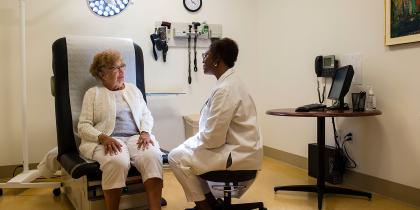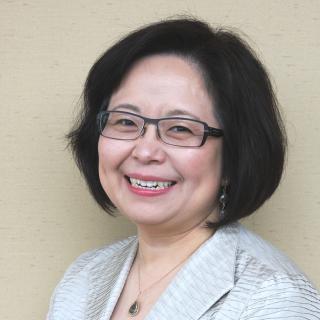When Should You See a Geriatrician?
Sometimes, older adults need specialized medical care for complex conditions. Learn when a geriatrician might be right for you or your parent.

Ultimately, you are the CEO of your health care. Patients should feel empowered to make decisions that support their personal goals for health and well-being. This means it’s important to choose a primary care physician who makes you feel comfortable about expressing your concerns and questions regarding your care and respects you and your family as the ultimate decision-makers.
Many of you may already have a primary care physician who you’ve known for years and with whom you’ve developed a personal and trusting relationship. And most PCPs are well-equipped to care for older patients, particularly if they’ve been caring for you for a long time and are well acquainted with your medical history.
Having said that, there may come a time when a doctor who specializes in the care of older adults may be the best choice for your care. Consider that most parents choose pediatricians to care for their children because they know that children are not just small adults and need specialized care both medically and emotionally. At the other end of the spectrum, older patients are also different from their younger adult counterparts in terms of their physical, emotional, and social care needs. In many cases, a geriatrician may the best choice as a person grows older, their health status changes, and they find that their goals for care become more complex.
What is a Geriatrician?
In addition to being board-certified and completing a residency in internal or family medicine, geriatricians complete a separate geriatrics fellowship, which involves one to two years of additional training. They specialize in health conditions that commonly affect older adults, such as osteoporosis, falls, and memory loss. Though geriatricians care for the gamut of seniors from the healthiest to the frailest, they’re particularly skilled at handling complex multisystem conditions that are common in older patients.
But arguably one of the most important hallmarks of geriatric medicine is that geriatricians take a more holistic approach to patient care. In geriatric medicine, longevity is limited as a measure for success. We don’t have a cure for old age and death. That’s why geriatricians and their patients focus on goals for care that prioritize ‘what matters most’ to the patient and their family.
One goal might be to maintain functional capacity, which impacts independence. Another goal is quality of life and comfort. So that is why a geriatrician has to look at patients from many different angles. Medical, social, cultural, functional, cognitive, and psychological considerations all come into play; sometimes financial considerations as well. Geriatricians often work with a team of professionals to provide appropriate care to older adults, which can include therapists, medical subspecialists, and social workers.
One of the roles of a geriatrician is to coordinate the overall care team and guide patients and their families or friends in making decisions regarding treatment options. Because of the complex needs of many older patients, geriatricians also spend time with their patients that other types of physicians are not always able to offer. Geriatrics practices usually schedule longer appointments to make sure that older adults have enough time to discuss all of their medical concerns with their doctors.
And finally, doctors choose to specialize in geriatrics because they enjoy interacting with older adults. We like having the luxury to spend more time with our patients and getting to know about their lives and histories. We learn a lot from them and gain a great sense of satisfaction from knowing we can make a difference in their—and their family’s quality of life—as they grow older.
How Do I Know if I Need a Geriatrician?
Making the choice to change doctors can be difficult. As I mentioned earlier, you may already have a long-standing relationship with a PCP or be experiencing a change in health status that is challenging both physically and emotionally. The following is a list of considerations that might drive the decision to seek care from a geriatrician.
- You have been diagnosed with multiple medical conditions.
- Managing multiple medications or other therapies has become complicated and you find that a treatment for one medical condition negatively affects a second condition.
- You are experiencing functional decline or physical frailty.
- You have one or more conditions associated with aging, such as dementia, incontinence, or osteoporosis.
- You need help coordinating care from multiple health care providers including, therapists, medical specialists, social workers, and mental health professionals.
How Do I Find the Right Geriatrician?
There are numerous important elements to consider when selecting a physician. Evaluating the following criteria will help determine which doctor is best suited to care for you.
- Experience – Review the physician’s education and training and ensure their board certifications are still current. You can find this information online or by asking the physician or their office’s receptionist directly.
- Personality and empathy – Before committing to a physician, schedule a brief 15-minute interview to help determine if their disposition and medical philosophy is the right fit for you or your parents.
- Hospital affiliation – Confirm the doctor is affiliated with your preferred hospital and that the hospital is conveniently located.
- Availability – Find out the average wait time to see the doctor, if the practice offers same-day urgent appointments and if the doctor or their colleagues are available for calls after hours. In addition, determine who the doctor of record will be if you or your parent is admitted to the hospital and what the system of communication will be with the hospital physician on admission, during hospitalization, and then on discharge from the hospital.
- Insurance – Check to ensure the practice accepts your or your parent’s medical insurance and, if not, find out if it is possible for your loved one to change medical plans.
- Office – Look for a doctor whose office staff is friendly and organized. Offices that use electronic outpatient records and electronic prescribing are also preferable.
Harvard Medical School-Affiliated Geriatricians
Geriatricians affiliated with Harvard Medical School are embedded throughout Hebrew SeniorLife’s continuum of care, including outpatient primary care practices for residents at NewBridge on the Charles in Dedham and Orchard Cove in Canton, inpatient post-acute rehabilitation, and long-term chronic care at Hebrew Rehabilitation Center, and community-based hospice. At each step of the journey, our clinical team provides highly individualized care focused on what matters most to our patients and their families. Learn more about Hebrew SeniorLife’s health care services or contact us today.
Blog Topics
Learn More
The Best Health Care for Seniors
Hebrew SeniorLife is the only senior health care organization affiliated with Harvard Medical School. Members of our caregiving teams specialize in providing geriatric care, and they do so with care and compassion.





